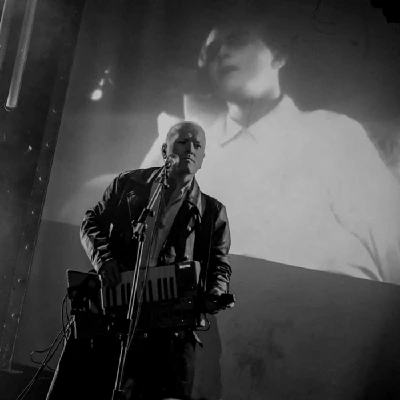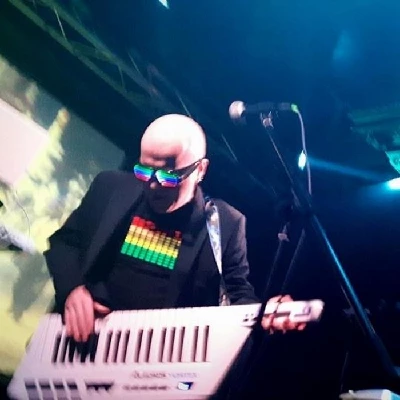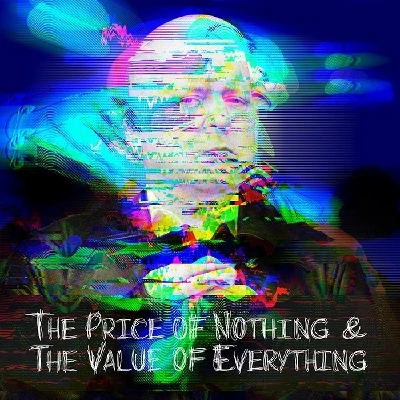published: 8 /
11 /
2019

Dublin-based musician Peter Fitzpatrick talks to Dave Goodwin about his synthpop project Circuit3 and its second album, 'The Price of Nothing and The Value of Everything'.
Article
Following on from the debut album, 'Siliconechipsuperstar', with his second helping of synth specialisation, 'The Price of Nothing & The Value of Everything', the exceptional musician that is Circuit3 AKA Peter Fitzpatrick has given up time from his busy schedule to talk to Pennyblackmusic.
Brought up on the Beatles in a musical family, he then got into the 80's electronic sound, idolising superstars like Vince Clarke and the phenomenal Thomas Dolby. He does in fact describe himself as "a bizarre mix of Thomas Dolby, Martyn Ware, Midge Ure, Vince Clarke and Neil Arthur."
'The Price of Nothing & The Value of Everything' is sure to get him noticed and put him on the ladder to greatness. Not a great deal is known about our electro-pioneer, so we asked him a few questions to try and prize out a fact or two and get to know a bit more
PB: Your sound is very 1980s. Is that the music you grew up listening to or were you someone who was there at the time?
PETER FITZPATRICK: The sounds originate from instruments made in the late 70s and early to mid-1980s but I reject the ‘80s’ pigeonhole. It’s an interesting phenomenon that some electronic artists find themselves put into a 1980s folder. We don’t suggest to rock guitar players that they sound very 1930s because that’s when electric guitars were developed. Nor do we suggest acoustic guitar accompanied folk singers are a 19th century ‘thing’.
I can, however, see why listeners would say that. The instruments are from that era and no doubt I’ve taken on board many arrangement and production influences. I’m definitely informed by and the sounds echo that era. You’re spot on that this is definitely the music that was front-and-centre when I was a teenager. Every teenager should have their musical year zero where they claim their music and mine is somewhere around 1981-1982.
I’m naturally drawn to well written songs and synth-based arrangements. Aside from the usual electronic suspects from late 1970s to mid-1980s I’m also quite influenced by classic pop songwriters like McCartney, Harrison, Jimmy Webb, Andy Partridge. If you look through my record collection you’ll see pretty much every popular electronic act from the late 70s early 80s and a few unpopular ones too.
PB: Who were your idols/favourite artists and did you take any of their sounds and develop them yourself?
PF:I grew up on the Beatles but that was all so out of reach for me both in terms of musicianship and finding other musicians at a young age who ‘got it’ and would explore playing that music. It was also the music of our parents so was allowed into the home. It was safe and a known quantity. I spent endless hours alone in a room with a cheap guitar trying to play those songs. But it was old music in my mind which had been made almost 10 years ago! That’s an eternity. Brilliantly crafted and undeniably brilliant but wasn’t ‘my’ music.
When synth pop landed like an atom bomb in my life around 1981 it was game over and I knew what I wanted to do. Vince Clarke is such an obvious idol and Yazoo are definitely my favourite artists. Thinking about other artists I have to say I’m a fan of Martyn Ware’s work and his Linndrum programming is the benchmark as far as I am concerned as is his production work. Thomas Dolby is probably who I have modelled my live show on with the use of video projection and attempting to be as extrovert as I can in my performance. The pop sensibilities evident in the work of Martin Rushent, Midge Ure and Howard Jones definitely informs what I’m doing. Outside the pop sphere there are artists who fascinated me with their sound design. Ones who immediately spring to mind are Fad Gadget, Cabaret Voltaire and Yello. When I want to go dark on a song I look to John Foxx as a guide in minimalism and atmosphere.
Of the modern artists I’m watching what Hannah Peel is doing as I think she is taking a folk tradition and putting an electronic wrapper around it in a very artistically valid and innovative way. If I could be a modern artist I think it’s Hannah for sure.
PB: 'The Price of Nothing & The Value of EVeything' is your second album. You say that this one shares a bit more of you. Is that musically or lyrically or both?
PF: Definitely both. If anything what I’ve tried to do on ‘The Price of Nothing…..’ is produce a more visceral sound. I want listeners to feel the sounds and atmosphere.
Musically on the first album I was playing with motifs and sounds because I could. At last I had the tools and felt the freedom to do it. I could now mimic some of what I loved as I now had the means of production. There’s obvious nods to Kraftwerk lines and I reckon Martyn Ware and Midge Ure can see their fingerprints on some of what I did on 'siliconchipsuperstar'.
With ‘The Price Of Nothing….’ I tried to be braver and do new things. My confidence in myself has grown and I’m slowly but surely getting closer to defining my own sound. On a couple of tracks I had to let go of traditional synthpop arrangement and sounds and just let go of the wheel. I remember playing the filter on an Arp Odyssey and controlling the feedback while it reverberated through a Lexicon signal processor (check the start of 'Dirty Little Secret'). You’ll have to picture this in your minds eye: me in a studio in Dublin pretending to be Billy Currie LOL.
Lyrically the new album is much more ‘me’ and digs into the classic songwriter influences. I’m naked on some of those songs! ‘DNA’ is such an example with my references to mental health. It’s not that I have particularly challenging mental health problems thankfully but like any human being it’s an aspect of my overall well-being that I’m very conscious of. ‘Fall in Love Again’ is as honest a love song that I’ve ever written. Someone said it sounded like it would have belonged on on the 3rd Yazoo album they never made. That was a huge compliment.
PB: How do you find it possible to stop halfway through writing one piece of work and move on to another and then return to the original later?
PF: I didn’t have any choice! I was pleased with the songs and recordings for the new album or so I thought. Then I had a massive crisis of confidence and decided they were sub-standard rubbish and nobody would want to give them a second listen. That’s one of the challenges in being a solo artist who writes, arranges, performs, engineers, produces, promotes, funds. Wearing all of those hats is exciting, exhausting and at times lonely.
I had also become really frustrated with any attempt to level-up and get into larger live shows as a support artist. I felt I was as good as anything else out there but repeatedly not even getting a ‘no thanks’. The proverbial straw was a gig where I was asked to open for a well-known artist which would have really helped broaden my audience but another act shamelessly muscled in. That was a real low point.
Despite this going on in the background I couldn’t tear myself away from my studio so instead of continuing with the album I decided to have fun and create something new. Next thing I know it’s a couple of months down the line and most of a new album has been written and recorded. I finished it and the several months break from the songs for ‘Price Of Nothing…’ gave me enough perspective to feel confident about finishing the mixes and releasing the album.
PB: How do you write your material? Is it a case of music first and then lyrics or does it work in another way?
PF; The answer to that question is all of the above. I remember the moment I wrote ‘Fall in Love Again’ which is the second single from the album. I was walking to my studio and the lyric and tune appeared in my head. I was in a good mood and could hear the sounds I wanted (very Fairlight… think Yazoo second album… Pet Shop Boys drum patterns) and the song came together in minutes in the studio.
With others I have to keep going back and re-writing such as ‘Breaking Point’ which was a song looking for a lyric and a meaning. Then the UK advisory referendum was passed and I had a lyric taken from Brexit news soundbites. Before then I had a bunch of sounds and a loose song structure.
‘The Rain’ was written the week I got my Roland Jupiter 4 as it was raining and I’m not really a fan of wet weather. I had the first line “I need the rain… when I feel this blue” and a chord progression on the Jupiter 4. Once I had the chords down I was able to build from that opening line.
PB:'Dirty Little Secret' heralds the introduction of the VC340 string machine. Is this a string emulator? What does it do and how do you incorporate it into your music?
PF: The VC340 is a string machine and vocoder released by Behringer shortly before I finished the album. It’s a ‘clone’ of the classic Roland VP-330 which is considerably more expensive and tough to find in good condition. I think they (Behringer) have done a great job with it. For people who don’t know what that vocoder sounds like I suggest checking out Laurie Anderson’s ‘Oh Superman’ on which it features. Put simply a vocoder takes your voice (the modulator) and splits it into many frequency bands to create a signature of your voice. A sound source (the carrier) is then put through that signature. It sounds like a talking synthesizer. People often refer to them as ‘robot voices’ probably because of how Kraftwerk used vocoders so effectively. The instrument is also a string machine and most well-known for its use by Vangelis on the Blade Runner soundtrack. I used it on ‘Dirty Little Secret’ as a string machine but it also appears both as a string machine and vocoder on ‘Face in the Crowd’. As a vocoder I’ve only used it for atmosphere and it blends into the strings. I’ve got some new recordings where I use it as an obvious vocoder.
PB: I might be being a bit thick here but what is the Black Dog?
PF: You’re not thick. The Black Dog is a term coined by Samuel Johnson where he used it to refer to his depression (it’s often incorrectly credited to someone else). It has come up in interviews about this album because I mentioned it in connection with the song ‘DNA’. ‘DNA’ tries to rationalise how I feel about my mental health which wasn’t in a good state during the recording of this album. Hence the lyrics "I can’t change my DNA….. some days are better than others." I guess I’m trying to keep the conversation about men’s mental health alive and chip away at the shame of speaking about it. We’re okay to talk about having a ‘man flu’ so why not a ‘man brain’? A friend once said to me "when we have a toothache we go to the dentist so why do we do nothing when we have a heartache?"
PB: Of all the comments re Circuit3 sounding like this band or that, who in your own mind do you think you sound like and is synth your one and only genre of music or are you open to other styles?
PF: In my own mind I’m a bizarre mix of Thomas Dolby, Martyn Ware, Midge Ure, Vince Clarke and Neil Arthur. That’s one hell of an ugly (and bald) child, eh? In reality I am probably closer to a Celtic-Dystopian-Howard Jones. Electronic pop music is the genre which enables and empowers my voice. I’ve tried other genres such as traditional Irish music (as a child), folk-pop which I tried around ten years ago and ended up disliking everything about. Whenever I’ve drifted away to try something else I’ve always been drawn back to electronic music. It gives me complete control over every element of my art and always allows me to produce what I hear in my head.
PB: What is your musical background? Are you classically trained? What other jobs did you do when you were younger?
PF: I have a degree in music which in hindsight was poorly taught and based on outdated notions of what should be in a music degree. Having a university education opened up doors that a kid who came from where I came from would not have dared knock on. I am grateful for having that education but looking back the content of the degree was pretty poor but I didn’t know any better at the time. I had no help or mentor. How I managed to graduate with a degree and music (and mathematics) I still find amazing.
So, yes, to a certain extent you could say I’m classically trained in that I took piano lessons until I completed university having started at the ripe of age of nineteen years. But I’m not really. Growing up I wanted to learn but the reality was that even if we had room in our home for a piano there was no way we could afford one nor could we pay for lessons. That was for other kids. I desperately wanted to learn and had a lot of pressure to conform and get an education.
For a time I was a composer and sound designer in New York working on the early ground-breaking CD-ROM multimedia titles. Fun times and award winning too. Got to meet some cool people like Peter Gabriel. I learned a lot about maximising sound from rudimentary tools. I got to put my music education to use and, well, New York…what’s not to like? I was in a couple of bands in NY and got to use some amazing studios with old Moogs and a Synclavier (this was when a Synclavier could cost over $200,000 !)
PB: Do you believe in conspiracy theories and if so which in your eyes is your most definite?
PF: In the conventional meaning of ‘conspiracy theories’ I know they are an affront to critical thinking, reasoning and science. I don’t encourage them.
PB: I have seen photos of you - you like loud clothes?
PF: Ha! I think so yes. I’m making up for lost time I suppose. Couldn’t dress how I’d have liked to in my youth and now I have a bit more confidence. I’ve toned it down a little now. My stage wear is now leaning more toward long coat, boots, bright shirts and a bit of eyeliner … goth-light or Midge-ultra depending on your point of reference. It’s important to have a recognisable image and identity but perhaps I’ll leave the test-card-suit in the archive for now. That polyester sparks in the dark!
PB: Thank you.
Band Links:-
http://www.circuit3.com/
https://www.facebook.com/pg/circuit03
https://twitter.com/circuit3music
https://circuit3.bandcamp.com/
Picture Gallery:-

